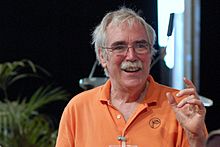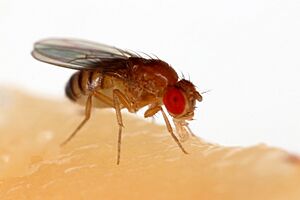Eric F. Wieschaus facts for kids
Quick facts for kids
Eric Francis Wieschaus
|
|
|---|---|

Eric F. Wieschaus in 2011
|
|
| Born | June 8, 1947 South Bend, Indiana, U.S.
|
| Education | University of Notre Dame (B.S.) Yale University (Ph.D.) |
| Known for | Embryogenesis |
| Awards | Genetics Society of America Medal (1995) Nobel Prize in Physiology and Medicine (1995) |
| Scientific career | |
| Fields | Developmental biology |
| Institutions | Princeton University Robert Wood Johnson Medical School |
Eric Francis Wieschaus is an American scientist who won the Nobel Prize in 1995. He was born on June 8, 1947, in South Bend, Indiana. He is a developmental biologist, which means he studies how living things grow and develop from tiny beginnings.
Contents
Early Life and Education
Eric Wieschaus grew up in South Bend, Indiana. He went to high school in Birmingham, Alabama. Later, he studied biology at the University of Notre Dame. He then earned his Ph.D. in biology from Yale University.
Scientific Discoveries
Studying Fruit Flies
In 1978, Dr. Wieschaus began his first independent job in Germany. A few years later, in 1981, he moved back to the United States to work at Princeton University.
Much of his work has focused on how fruit flies develop. He studied the tiny fruit fly called Drosophila melanogaster. He looked closely at how the fruit fly embryo forms its body parts very early on.
The Heidelberg Screen
Dr. Wieschaus and his colleague, Christiane Nüsslein-Volhard, wanted to understand which genes control the early development of the fruit fly. They did a huge experiment called the "Heidelberg screen." They looked at thousands of fruit flies with small changes in their genes. By doing this, they found many genes that are essential for a fruit fly embryo to develop correctly.
They discovered that many important instructions for development are already present in the unfertilized egg. However, some key instructions come from genes that become active in the embryo itself. Dr. Wieschaus focused on these "zygotically active" genes. He believed that understanding when and where these genes turn on could explain how embryos develop in the right order.
Nobel Prize Recognition
In 1995, Eric Wieschaus, along with Edward B. Lewis and Christiane Nüsslein-Volhard, received the Nobel Prize in Physiology or Medicine. They were honored for their groundbreaking work that showed how genes control the early development of an embryo. Their discoveries helped us understand how a single cell grows into a complex living creature.
As of 2018, Dr. Wieschaus is a professor of Molecular Biology at Princeton University. He also used to be a professor at the Robert Wood Johnson Medical School.
Personal Life
Eric Wieschaus is married to Gertrud Schüpbach, who is also a molecular biologist and a professor at Princeton University. She also studies fruit flies. They have three daughters.
Dr. Wieschaus has supported science education. For example, he signed a petition in 2007 to support teaching science in schools.
Awards and Honors
- Member of the American Academy of Arts and Sciences, elected 1993
- Member of the National Academy of Sciences, elected 1994
- Nobel Prize in Physiology or Medicine, 1995
- Member of the American Philosophical Society, elected 1998
- Mendel Medal of the Genetics Society, 1999
See also
 In Spanish: Eric Wieschaus para niños
In Spanish: Eric Wieschaus para niños
 | Bayard Rustin |
 | Jeannette Carter |
 | Jeremiah A. Brown |


